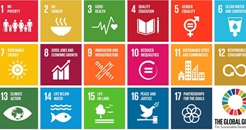 The SDGs Game
The SDGs Game
The Sustainable Development Goals (SDGs), also known as the Global Goals, are 17 goals and 169 targets set to achieve by the year 2030 to end poverty, protect the planet and ensure prosperity for all as part of a new sustainable development agenda.
Achieving the SDGs requires the partnership of governments, private sector, civil society and citizens alike to make sure we leave a better planet for future generations. For more information about the SDGs, click on the button below:
Now there is a game to experience how by working together you can make a difference on the global scale, from your very own company or community. Everything you do matters. The 2030 SDGs Game participants wake up to the systemic impact they already have. They see ways they can take action to make positive change that they previously had not considered.
The 2030 SDGs Game is a multi-player, in-person, card-based game that simulates taking the “real world” into the year 2030. Designed in Japan in 2016, this experience has become a powerful and impactful social phenomenon in Japan, earning extensive media coverage and reaching over 50,000 participants in the last 2 years.
2030 SDGs Game events are held in corporate, governmental, educational, and community settings, and now has over 300 trained facilitators in a rapidly growing community within Japan and an English version has been launched.
To maximise the positive impact in your organisation or community, you should include participants who might be able to work together on projects that make a difference (whether or not those participants know each other yet). The experience is best with about 35 participants, but the game can accommodate 5 to 48 participants quite easily and groups of up to 200 with a slight adjustment to the process. Larger groups are possible with more preparation.
The full experience takes two to three hours for Community and Nonprofit games, and three to four hours for Corporate games (where business content is reviewed in more depth). Often the final hour is the most valuable. In the final hour, participants have already explored the implications of their choices together, and have begun applying their new insights to their lives and their work.
Here is a case study of the effect:
Thirty seven top executives of Hitachi Capital, including the CEO, gathered for a half day training featuring the 2030 SDGs Game. After the training, the company launched a new investment re social business and NGO collaboration.
Since April 2016, their policy has been to become a “company creating social value”: an organization that tackles social issues and listens to customer needs. They became determined to transform their business into much more than a conventional finance company. To make this policy a reality, it was crucial for their business and management practices to incorporate the SDGs. Management plans need to be prepared from the viewpoint of ESG (environmental, social and governance) standards, which are based on the SDGs.
Sustainability means taking on the challenges faced by society and our stakeholders, and providing solutions that utilize individual strengths. It also means continuously delivering and enjoying added value.
It was their belief that not only do they need to learn basic knowledge and case studies, they also needed to cultivate a stance of engaging with social issues through dialoguing with stakeholders regarding the SDGs and taking effective action. That is why they organized the SDGs Game for a total of 37 people including their executive officers, directors and presidents of their domestic group companies.
There was a relatively high degree of satisfaction (average 3.84 out of 4) with the event which helped participants to develop a deeper understanding.
Here are some comments from participants:
“The motivation to solve problems in our world has to come from me. It’s simply not enough for me to have the attitude of ‘let the company handle it.’”
“Now I understand the importance of connection. My actions will be different from now on.”
“One major theme that emerged was that the needs of society and the environment cannot be solved with the efforts of just one company. I see now that we need to establish partnerships and share financial responsibility to meet those needs.”
“This event made the relationship between social issues and the individual readily apparent. I realized that change really starts with me, and this will change the actions I will take moving forward, increasing the possibility of achieving the SDGs.”
“Through these workshops, I realized the importance of collaboration and connecting with other departments outside of my own section or company. In order to expand my own understanding and gain a deeper perspective of the SDGs, I would like to have discussions during training sessions in my own section.”
They believe that their company has just reached the starting line to become a company creating social value, a company that through working with their stakeholders empowers each of their employees to respond to social issues and customer needs based on the SDGs.
For more information on the Game, see here
For a facilitator in the UK (there are several), see here.
Retweet about this article:
Geoff Knott, 07/08/2019